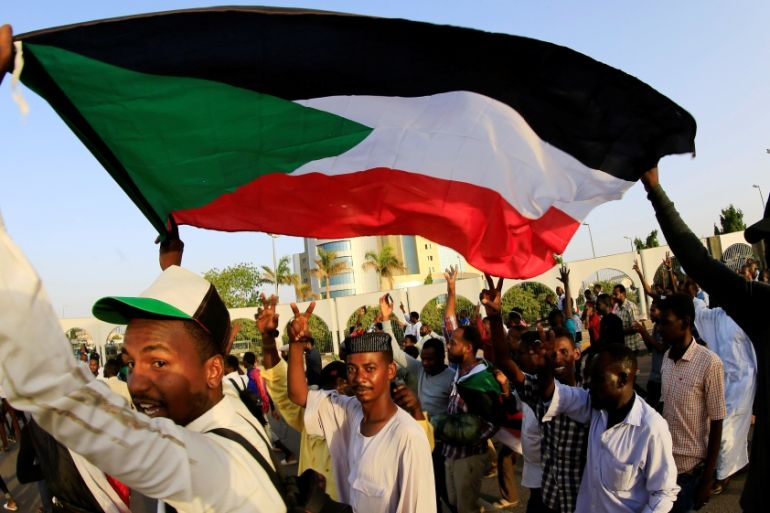Sudan protesters decry military council’s suspension of talks
Protest leaders slam move to halt negotiations over political transition for 72 hours, vow to keep demonstrating.

Sudanese protest leaders have denounced the ruling military council’s 72-hour suspension of talks over a peaceful transfer of power to civilian rule as a “regrettable” setback to efforts to forge a new democratic era following the overthrow of veteran leader Omar al-Bashir.
The Alliance for Freedom and Change, the umbrella group leading the protest movement and negotiating the transfer of power with Sudan’s Transitional Military Council (TMC), said in a statement on Thursday that the generals’ move “ignores the developments achieved in negotiations so far”.
Sudan‘s protest leaders and the TMC had been expected to meet on Wednesday evening to hammer out an agreement on the makeup of the ruling body designed to steer the country towards democracy having already reached an agreement on the composition of a 300-member legislative council and a three-year transition period to a civilian administration.
But in the early hours of Thursday, the chief of Sudan’s ruling military council, General Abdel Fattah al-Burhan, announced the talks had been suspended amid a deteriorating security situation in the capital, Khartoum.
Al-Burhan accused protesters of disrupting life in the city by blocking roads outside a protest zone set up outside of the defence ministry, where demonstrators have held a weeks-long sit-in.
He also called on demonstrators to open blocked bridges connecting the capital with other regions and “stop provoking security forces”, saying the TMC was waiting until “a suitable atmosphere is created to complete an agreement” with the opposition alliance.
The protest movement vowed to maintain sit-in protests outside the defence ministry and across the country, however.
Protesters killed
The dispute came after at least 14 people were wounded, some from gunfire, on Wednesday when Sudanese forces tried to remove demonstrators from central Khartoum, according to the Central Committee of Sudanese Doctors.
Protesters said troops in military vehicles using the logo of the paramilitary Rapid Support Forces (RSF) – whose chief is also the deputy head of the military council – fired extensively as they tried to clear demonstrators from an avenue near Sudan’s foreign ministry.
“People were walking towards the barricades and they (security forces) were firing shots at them,” a 20-year-old demonstrator, who asked not to be named, told Reuters News Agency, showing a handful of empty bullet casings and referring to roadblocks set up by protesters.
The RSF denied opening fire at demonstrators, state TV reported.
On Monday, similar violence in Khartoum saw security forces open fire while allegedly trying to clear protest sites, leaving at least four people dead, including three protesters and a military police officer. They were the first deaths linked to the protests for several weeks.
Al Jazeera’s Hiba Morgan, reporting from Khartoum, said the TMC denied responsibility for Monday’s violence.
“The military council came out and said the people who fired at protesters were not part of their forces or from the RSF,” she said, adding that the military council said it would launch an independent investigation into the incident.
The United States blamed Sudan’s military rulers for the deaths, however.
“The tragic attacks on protesters … were clearly the result of the Transitional Military Council trying to impose its will on the protesters by attempting to remove roadblocks,” the US embassy in Khartoum said in a statement on Facebook.
“The decision for security forces to escalate the use of force, including the unnecessary use of tear gas, led directly to the unacceptable violence later in the day that the TMC was unable to control.”